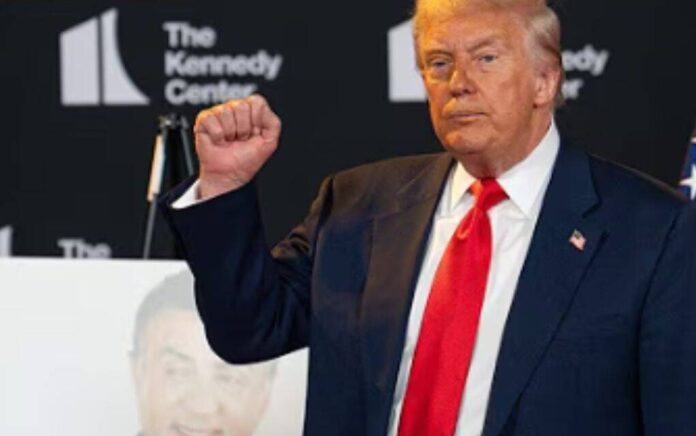
There’s one man in this country who has the power to change things. And now he has a big decision to make.
Because Donald Trump was hit with an urgent request that could change America forever.
Unauthorized Cabotage: Undermining America’s Backbone Industry
In the heart of America’s supply chain, where trucks rumble across vast highways delivering everything from groceries to industrial goods, a shadowy violation is eroding the foundations of the nation’s largest employer. The American Trucking Associations (ATA), a powerhouse representing over 37,000 motor carriers and suppliers nationwide, has issued a fervent plea to the Trump administration to halt the illegal practice of cabotage. This involves unauthorized Mexican drivers, often operating under B-1 visas meant for international transit, hauling freight strictly between U.S. points without proper authorization.
As detailed in a letter obtained by the Daily Caller News Foundation, dated September 2025, ATA President Chris Spear directly addressed DHS Secretary Kristi Noem, framing the issue as a blatant assault on American workers. “A foreign driver engaged in cabotage is not a technicality or a minor paperwork violation,” Spear wrote. “It is outright lawbreaking that suppresses wages and work for American truck drivers.” This isn’t just rhetoric; it’s a call to arms against a practice that’s ballooned in recent years, fueled by lax enforcement and economic pressures in the trucking sector.
To understand the depth of this crisis, consider the mechanics: Under longstanding U.S. customs laws, rooted in the Jones Act and international trade agreements like NAFTA (now USMCA), foreign drivers from Mexico or Canada can cross borders to drop off international loads and pick up outbound cargo. But any domestic leg—say, from Texas to California—is off-limits, designed to shield U.S. jobs from undercutting.
Yet, as complaints have surged since 2021, U.S. carriers are exploiting B-1 visas, which are for business visitors, to hire these drivers for purely internal hauls. This loophole allows companies to pay wages as low as a fraction of U.S. standards—often $10-15 per hour versus $25-30 for American drivers—while dodging taxes, benefits, and safety regulations. The result? A distorted marketplace where honest operators struggle to compete, and the industry, which moves 72% of the nation’s freight, faces existential threats.
Economic Warfare on the Open Road: How Cabotage Devastates U.S. Carriers
The ripple effects of cabotage extend far beyond individual routes, striking at the core of economic fairness and industry viability. “U.S. carriers who flout these rules gain an unlawful competitive advantage over law abiding companies, distorting the marketplace and putting compliant operators at risk of closure,” Spear continued in his letter. Each illicit load isn’t just a violation—it’s a direct theft from American pockets. Spear quantified this starkly: “Each illegal load carried by an unauthorized foreign driver represents income stolen directly from a hardworking U.S. driver.”
Delving deeper, historical precedents underscore the pattern’s severity. Back in 2019, federal indictments in southern Arizona exposed two companies that netted $2.4 million and $1.3 million, respectively, by employing underpaid Mexican drivers for domestic runs, leading to convictions and shutdowns, as reported by the Arizona Daily Star. Fast-forward to 2025, and the issue has escalated.
At the Truckload 2025 conference in Arizona, ATA Chief Economist Bob Costello revealed that U.S. Customs and Border Protection (CBP) officials at the Laredo port confirmed widespread misuse, with fleets instructing B-1 drivers to grab domestic loads upon entry. FreightWaves investigations since 2021 highlight how this has worsened, particularly in border states like Texas and New Mexico, where Permian Basin oil hauls and cross-border trade amplify the abuse.
On platforms like X (formerly Twitter), American truckers vent raw frustration. One veteran driver posted in August 2025: “US trucking gets destroyed by cheap illegal foreigners… Cabotage goes unenforced. Carriers come, go overnight. Rules only harm legit carriers.”
Another exposé video, shared widely, showed parking lots “full of Mexican trucks” with blue tags meant for cross-border use, now exploited for months-long illegal stays, putting “thousands of my friends out of business.” These aren’t isolated rants; they echo ATA data showing wage stagnation and carrier closures, with overcapacity driving down rates by 20-30% in some lanes. Environmentally, it wastes fuel on inefficient empty backhauls, as foreign trucks can’t legally return loaded, clashing with sustainability goals.
Enforcement Imperative: ATA’s Push for DHS Action and Administration Wins
The ATA isn’t just sounding alarms—they’re demanding results, urging DHS, the sole enforcer of cabotage laws, to ramp up resources for audits, visa revocations, and penalties.
“These are not isolated bad actors — they are part of a pattern of willful lawbreaking that undermines the integrity of our supply chain,” Spear asserted. A focused crackdown on the “relatively small number” of offenders, he argues, would ripple industry-wide, deterring copycats without broad overhauls. In an April 2025 letter to Transportation Secretary Sean Duffy, Spear echoed this, calling for FMCSA-DHS collaboration on B-1 patrols.
The Trump administration’s early moves have sparked optimism. In April 2025, President Trump signed an executive order reinstating rigorous English proficiency standards for CDL holders, requiring fluency in road signs to prevent tragedies like the August 2025 Florida Turnpike crash, where an unlicensed Indian migrant driver, unable to read basics, caused fatalities.
The ATA publicly thanked the White House, noting it aligns with border security tightenings. Recent enforcement bites: Over 100 Mexican visas revoked in the past month alone, with CBP detaining 20 drivers in Calexico for cabotage in July.
X users like @EOSTrucking pleaded directly: “Mexicans have also been breaking our trucking agreement… TAKING WORK AWAY FROM SAFE AMERICAN TRUCK DRIVERS!!! The American Citizens of the American Trucking Industry ARE PLEADING FOR ACTION!!!!” DHS has affirmed it “takes cabotage seriously,” but truckers want more boots on the ground.
Why U.S. Truckers’ Concerns Are Absolutely Justified: A Deeper Dive
American truckers’ outcry over cabotage isn’t hyperbole—it’s a data-backed indictment of systemic failures that demand urgent reform. Here’s why their position holds unassailable merit:
- Wage Suppression and Job Losses as Economic Sabotage**: At its root, cabotage is predatory pricing in motion. Mexican drivers, bound by lower home-country wages and no U.S. labor protections, accept rates 40-50% below American norms, per ATA estimates. This floods the market with cheap labor, compressing freight rates and forcing U.S. carriers—especially independents and small fleets—into bankruptcy. A 2025 Teamsters study via Empower LLC pegged annual losses in Laredo alone at millions, with nationwide figures likely in the billions, as illegal hauls siphon revenue from 3.5 million American drivers. X posts from truckers like @Andersonj2273 capture the despair: “Make trucking American again. Get the foreign occupation out… Enforce Cabotage laws.” Without enforcement, it’s a race to the bottom, hollowing out middle-class jobs in an industry generating $940 billion annually.
- Safety Risks Amplified by Lax Oversight**: Beyond economics, cabotage endangers lives. Unauthorized drivers often skirt FMCSA hours-of-service rules, English requirements, and vehicle inspections, heightening crash odds. The Florida incident exemplifies this: An unqualified driver caused a multi-fatality pileup, prompting ATA scrutiny of California’s lax licensing. Broader data from CBP shows detained drivers frequently lack proper training, contributing to a 15% uptick in border-state accidents involving foreign rigs since 2021. Truckers on X, like @SulfideCheetah, decry it as “vagrant cabotage violations… hurting domestic trucking,” tying it to broader proficiency failures. Enforcing cabotage would filter out these risks, aligning with Trump’s EO to mandate English fluency— a proven safeguard, as states with strict standards see 20% fewer commercial crashes.
- Market Distortion and Supply Chain Fragility: Illegal operators thrive on impunity, renaming fleets overnight to evade fines, as noted in X rants about “crooked foreign just rename.” This erodes trust in the supply chain, which ATA warns could cascade into shortages if compliant carriers fold. Economically, it violates USMCA spirit, rewarding cheats while punishing rule-followers—much like Canadian cabotage bans that U.S. drivers respect but aren’t reciprocated. A targeted DHS push, as Spear advocates, is feasible: With only a “small number” of violators, audits at ports like Laredo could yield quick wins, boosting compliance rates by 30-40%, per industry models.



















